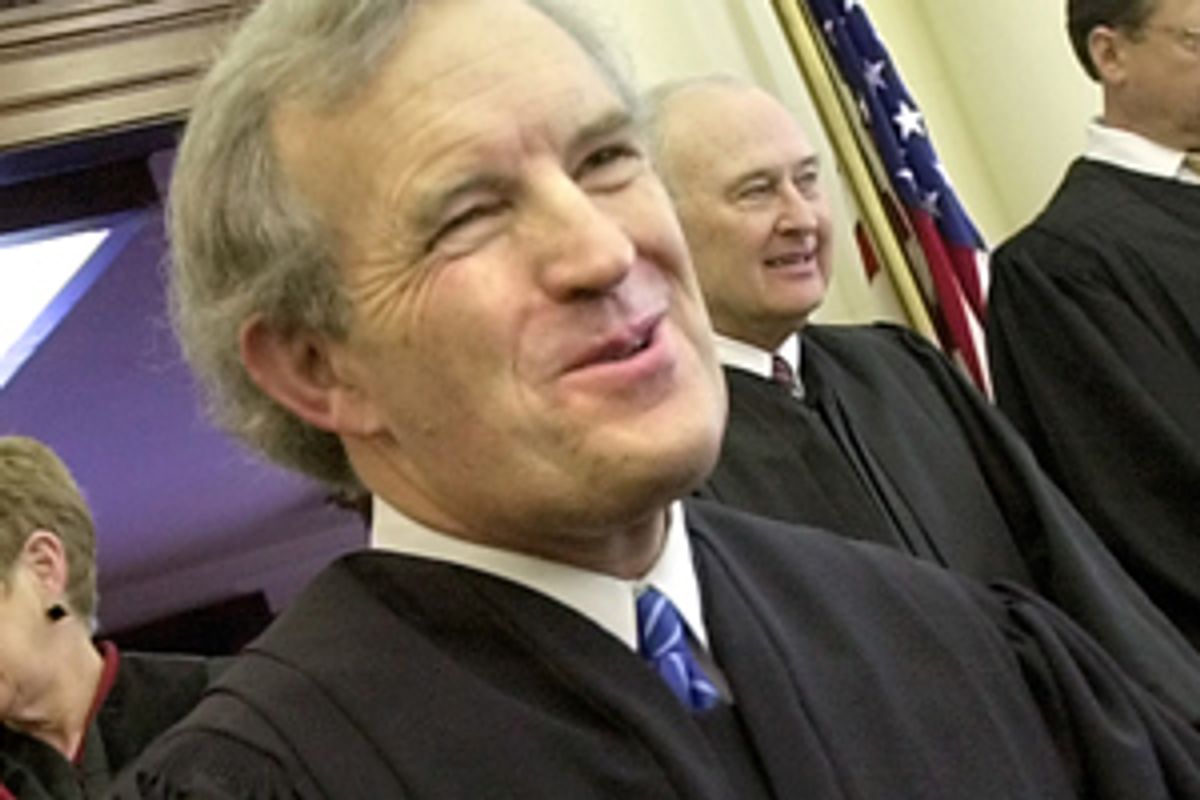President Bush's nomination of Judge James H. Payne to one of the highest courts in the nation has been withdrawn, following questions raised in late January about Payne's ethics.
Currently chief judge of the U.S. District Court in Muskogee, Okla., Payne was nominated by Bush to the Denver-based 10th U.S. Circuit Court of Appeals last September. At the time, his nomination appeared to have no roadblocks: His 2001 nomination by Bush to become a district judge in Oklahoma had been confirmed unanimously by the Senate, and as it had in 2001, the American Bar Association gave Payne its top approval rating in December as he headed toward the 10th Circuit. But Payne's qualifications drew scrutiny after Salon reported on Jan. 23 that Payne's career on the federal bench was riddled with conflicts of interest: Court and financial records show that he issued more than 100 orders in at least 18 cases involving corporations in which he had reported stock holdings. Both federal law and the Code of Conduct for U.S. judges prohibit judges from sitting on such cases.
In response to that initial report, Senate Judiciary Committee staff, as well as the chief judge of the 10th Circuit Court, said they planned to look further into Payne's record. Meanwhile, also on the heels of the report, Payne abruptly disqualified himself from two product-liability suits against drug titan Pfizer -- a company in which Payne has reported stock holdings of up to $15,000 since 1999. After learning about the conflicts of interest, the American Bar Association reevaluated Payne, and lowered his rating Feb. 21.
The White House announced the withdrawal at 8 p.m. EST Tuesday. Apparently the decision to stop his career short of the nation's second-highest bench came at Payne's own prompting. "He asked to have his name withdrawn, and we've honored that request," said White House spokesman David Almacy.
Payne, who has never commented on or disputed the findings in the Salon reports, did not return a phone call to his office late Tuesday.
Professor Stephen Gillers, a legal ethics expert at the New York University School of Law, said a pattern of conflicts like Payne's "really speaks ill about a judge's awareness of his responsibilities" and can "easily explain" the decision to withdraw. A Senate confirmation hearing for Payne that would have been likely to highlight the ethical problems, Gillers said, could have proved embarrassing to the Bush administration, Oklahoma's two Republican senators, James Inhofe and Tom Coburn -- who have backed Payne so far -- and the judge himself.
"This is going to have a ripple effect on district judges who aspire to the circuit to pay more attention to the recusal rules," Gillers added. "This is a bold announcement to the federal trial bench that the recusal rules do matter and that ignoring them can kill your aspirations to promotion."
While the White House said it was Payne's decision, Gillers noted, "If the White House and the senators said, 'We're with you, we'll stand by you, we can beat this,' I don't think we'd be in this situation."
Republican and Democratic staff of the Senate Judiciary Committee, which had not yet scheduled Payne's hearing, declined to comment. Inhofe and Coburn did not return Salon's phone calls.
Professor Steven Lubet, an ethics scholar at the Northwestern University School of Law, suggested there might be other reasons for the Payne withdrawal aside from the conflict-of-interest issue. "Given the judges that the White House has backed to the hilt, I would speculate that there's something here that has caused them pause, and I would just have to guess that it's not something that we're aware of," Lubet said.
The ethics problem, however, may well be enough to sink a nomination in this political climate, said Professor Monroe Freedman, of the Hofstra University School of Law. "Possibly, Republican senators are getting a little bit anxious about any more tarring, and the situation with this guy is not one that's readily defensible," he said. "It's possible that they just don't want to be in the situation of defending conflicts of interest. There has been enough embarrassment on the Republican side with this kind of problem."
And it wasn't just one mistake by Payne. It was the "pervasiveness" of his failures to recuse himself from multiple cases, involving multiple stock holdings, that most concerned Professor Leslie W. Abramson, of the University of Louisville's law school, who reviewed Payne's cases. Payne even recused himself properly sometimes, Abramson noted -- showing that he knew the rules, or at the very least a clerk working for him did.
In any case, said NYU's Gillers, "it certainly means that someone anticipated a difficult confirmation hearing that might ultimately have been unsuccessful."



Shares